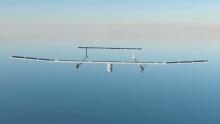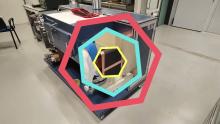Flying across the Ocean with solar energy: one of the frontiers of research at Politecnico. New-generation, ultra-lightweight, high-performance materials, combined with advanced propulsion and storage systems, represent the future of aviation.
Sustainable propulsion also means green hydrogen, obtained from water and fuel cells, which convert fuel energy into electricity.
Yet, the green revolution in aviation necessitates a major rethinking of infrastructure: equipped airports, storage systems, and distribution networks for clean fuels.
Likewise, it is essential to store energy safely and efficiently. Politecnico leads international cutting-edge research into the latest generation of batteries, focusing in particular on lithium, sodium, and potassium, which are safer, more durable, and easier to recycle.
Finally, materials are also essential. Politecnico's research on advanced materials extends to the aeronautical sector, to make future aircraft lighter, recyclable, and more efficient.
By PoliTO Student Team ICARUS. Academic Advisor: Prof. Paolo Maggiore
The RA (Record Aircraft) project aims to develop a fully electric, solar-powered aircraft with extended autonomy. Conceived as an unmanned aerial vehicle (UAV), RA is designed to operate continuously with zero carbon emissions, powered exclusively by solar energy. Its high-aspect-ratio wings, equipped with high-efficiency solar cells, recharge onboard batteries to enable reliable night-time operations. The lightweight carbon-fiber composite structure ensures strength and durability, while the propulsion system is optimized for low-speed, energy-efficient cruising. An advanced autopilot enables autonomous, long-endurance missions, supporting applications such as environmental monitoring and power-line maintenance. Backed by partners including ENAC (the Italian Civil Aviation Authority) and endorsed by astronaut Maurizio Cheli, RA stands as a milestone in sustainable aviation, proving that long-duration, zero-emission flight is not only feasible but within reach.
By NODES – Nord Ovest Digitale e Sostenibile (Digital and Sustainable North-Western Italy), Spoke 1, Aerospace and sustainable mobility. Coord: Fabrizio Pirri, Marzia Quaglio
The H2Mobility project, one of the three flagship initiatives of Spoke 1 Aerospace and Sustainable Mobility within the NODES (Nord Ovest Digitale e Sostenibile) ecosystem (a NextGenerationEU project), is a strategic effort to accelerate the transition to hydrogen-powered transportation. Coordinated by Politecnico di Torino, the project focuses on developing technologies and infrastructure to support the use of green hydrogen, particularly in high-energy-demand sectors such as heavy-duty vehicles and long-range transport, including aerospace applications.
H2Mobility aims to build a complete hydrogen value chain—from production and storage to distribution—while ensuring environmental sustainability and safety, bringing together universities, research centers, innovation hubs, and private companies. While Politecnico researchers explore the potential of hydrogen in aviation, the project current emphasis is on enabling infrastructure, new technologies, new components and innovative services for the storage of green H2, and on distribution networks.
Beside H2 storage, distribution and use capabilities, the project is also addressing E-Fuels. In this regard, the research activity will focus mainly on the development of components, technologies and systems for conversion of CO2 and other vectors into Renewable Fuels of Non-Biological Origin (RFNBO).

By PoliTO Department of Mechanical and Aerospace Engineering - DIMEAS. Coord: Giorgio De Pasquale
The MIMOSA project (Multimaterial airframes based on 3D joints between AM metals and carbon-fiber composites), coordinated by Politecnico di Torino, is a Horizon Europe initiative aiming to transform the design and production of sustainable aircraft structures. It focuses on hybrid airframes that combine additively manufactured metals with carbon-fiber composites using advanced 3D joint technologies. These structures are designed to reduce environmental impact, optimize material use, and improve production efficiency and recyclability. MIMOSA involves a European consortium including Leonardo, TÜV Italia, Bytest, Veplas, F3nice, GBP Metal Group, and Joanneum Research. The project’s integrated manufacturing approach reduces production steps, simplifies logistics, and supports circular economy principles by enabling material recovery at end-of-life. It also addresses the need for new certification processes for additive manufacturing and composite bonding. Through digital design, simulation, and testing, MIMOSA sets new standards for performance and sustainability in aerospace, contributing to lighter, greener aircraft over its three-year timeline.

